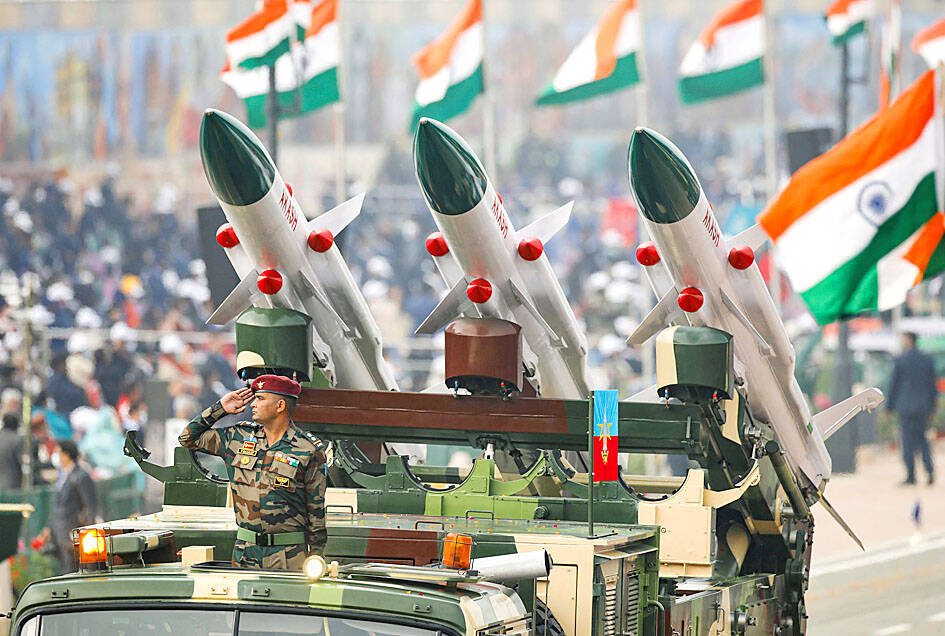New Delhi is to buy portable air-defense missiles to deploy along its border with China as militarization in the region gathers speed and hostilities between the two countries enter a third year.
The Defense Acquisition Council — headed by Indian Minister of Defense Rajnath Singh — cleared the purchase of the very short-range missiles that can be carried by troops, according to a statement issued late on Tuesday.
“In view of the recent developments along the northern borders, there is a need to focus on effective air defense weapon systems which are man portable and can be deployed quickly in rugged terrain,” the ministry said.

Photo: Reuters
Meant for neutralizing low-altitude aerial threats at close range, the missile is designed and developed by Indian research organization DRDO and is similar to US-made FIM-92 Stinger surface-to-air missiles.
Such defense missile systems have proved to be effective in recent conflicts and the Pentagon is providing at least 1,600 Stinger missile systems to Ukraine to fend off Russian air attacks.
Tensions along the Asian nations’ disputed border have simmered since a June 2020 clash — the worst in more than 40 years — left at least 20 Indian and at least four Chinese soldiers dead.
That fighting was centered around the Himalayan region of Ladakh, along their 3,488km border known as the Line of Actual Control.
Last month, troops clashed in the northeast Indian border state of Arunachal Pradesh.
Military commanders of the two nations have held 17 rounds of talks to attempt to defuse the border crisis, but progress has been glacial.
The ministry also cleared the purchase of locally made anti-tank missiles for helicopters and Brahmos anti-ship missiles for its warships.
The total cost of the military hardware would cost 42.76 billion rupees (US$523.7 million), but the ministry did not disclose the estimated price of each of the three items.

ENDEAVOR MANTA: The ship is programmed to automatically return to its designated home port and would self-destruct if seized by another party The Endeavor Manta, Taiwan’s first military-specification uncrewed surface vehicle (USV) tailor-made to operate in the Taiwan Strait in a bid to bolster the nation’s asymmetric combat capabilities made its first appearance at Kaohsiung’s Singda Harbor yesterday. Taking inspiration from Ukraine’s navy, which is using USVs to force Russia’s Black Sea fleet to take shelter within its own ports, CSBC Taiwan (台灣國際造船) established a research and development unit on USVs last year, CSBC chairman Huang Cheng-hung (黃正弘) said. With the exception of the satellite guidance system and the outboard motors — which were purchased from foreign companies that were not affiliated with Chinese-funded

PERMIT REVOKED: The influencer at a news conference said the National Immigration Agency was infringing on human rights and persecuting Chinese spouses Chinese influencer “Yaya in Taiwan” (亞亞在台灣) yesterday evening voluntarily left Taiwan, despite saying yesterday morning that she had “no intention” of leaving after her residence permit was revoked over her comments on Taiwan being “unified” with China by military force. The Ministry of the Interior yesterday had said that it could forcibly deport the influencer at midnight, but was considering taking a more flexible approach and beginning procedures this morning. The influencer, whose given name is Liu Zhenya (劉振亞), departed on a 8:45pm flight from Taipei International Airport (Songshan airport) to Fuzhou, China. Liu held a news conference at the airport at 7pm,

AIR SUPPORT: The Ministry of National Defense thanked the US for the delivery, adding that it was an indicator of the White House’s commitment to the Taiwan Relations Act Deputy Minister of National Defense Po Horng-huei (柏鴻輝) and Representative to the US Alexander Yui on Friday attended a delivery ceremony for the first of Taiwan’s long-awaited 66 F-16C/D Block 70 jets at a Lockheed Martin Corp factory in Greenville, South Carolina. “We are so proud to be the global home of the F-16 and to support Taiwan’s air defense capabilities,” US Representative William Timmons wrote on X, alongside a photograph of Taiwanese and US officials at the event. The F-16C/D Block 70 jets Taiwan ordered have the same capabilities as aircraft that had been upgraded to F-16Vs. The batch of Lockheed Martin

GRIDLOCK: The National Fire Agency’s Special Search and Rescue team is on standby to travel to the countries to help out with the rescue effort A powerful earthquake rocked Myanmar and neighboring Thailand yesterday, killing at least three people in Bangkok and burying dozens when a high-rise building under construction collapsed. Footage shared on social media from Myanmar’s second-largest city showed widespread destruction, raising fears that many were trapped under the rubble or killed. The magnitude 7.7 earthquake, with an epicenter near Mandalay in Myanmar, struck at midday and was followed by a strong magnitude 6.4 aftershock. The extent of death, injury and destruction — especially in Myanmar, which is embroiled in a civil war and where information is tightly controlled at the best of times —